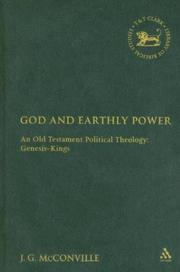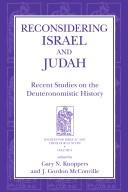| Listing 1 - 10 of 20 | << page >> |
Sort by
|

ISBN: 0567044939 9780567044938 Year: 2006 Volume: 454 Publisher: London: T&T Clark International,
Abstract | Keywords | Export | Availability | Bookmark
 Loading...
Loading...Choose an application
- Reference Manager
- EndNote
- RefWorks (Direct export to RefWorks)
Politics in the Bible. --- Bible. --- Criticism, interpretation, etc. --- 222 --- 221.08*01 --- Historische boeken van het Oude Testament --- Theologie van het Oude Testament: God--(Godsleer) --- 221.08*01 Theologie van het Oude Testament: God--(Godsleer) --- Politics in the Bible --- Political science --- Political science in the Bible --- Politics, Practical --- Biblical teaching --- Chumash --- Five Books of Moses --- Ḥamishah ḥumshe Torah --- Ḥumash --- Kitāb-i Muqqadas --- Mose Ogyŏng (Book of the Old Testament) --- Pentateuch --- Pi︠a︡toknizhīe Moiseevo --- Sefer Ḥamishah ḥumshe Torah --- Tawrāh --- Torà (Pentateuch) --- Torah (Pentateuch) --- Tʻoris xutʻcigneuli --- Ureta --- תורה --- Haftarot --- Historical Books (Books of the Old Testament)
Book
ISBN: 0853645884 9780853645887 Year: 1993 Publisher: Carlisle: Paternoster Press,
Abstract | Keywords | Export | Availability | Bookmark
 Loading...
Loading...Choose an application
- Reference Manager
- EndNote
- RefWorks (Direct export to RefWorks)
Book
ISBN: 0905774787 9780905774787 Year: 1984 Publisher: Sheffield: University of Sheffield,
Abstract | Keywords | Export | Availability | Bookmark
 Loading...
Loading...Choose an application
- Reference Manager
- EndNote
- RefWorks (Direct export to RefWorks)
Book
ISBN: 9780801048968 0801048966 Year: 2016 Publisher: Grand Rapids Baker Academic
Abstract | Keywords | Export | Availability | Bookmark
 Loading...
Loading...Choose an application
- Reference Manager
- EndNote
- RefWorks (Direct export to RefWorks)
Theological anthropology --- Biblical teaching --- Christianity --- Bible. --- Criticism, interpretation, etc.
Book
ISBN: 9780801030949 9781493436774 9781493436767 Year: 2023 Publisher: Grand Rapids, Michigan Baker Academic
Abstract | Keywords | Export | Availability | Bookmark
 Loading...
Loading...Choose an application
- Reference Manager
- EndNote
- RefWorks (Direct export to RefWorks)
"A highly regarded Old Testament scholar offers a substantive and useful commentary on Isaiah and explores the contemporary significance of this prophetic book"--

ISBN: 157506037X 9781575060378 1575065185 Year: 2000 Volume: 8 Publisher: Winona Lake: Eisenbrauns,
Abstract | Keywords | Export | Availability | Bookmark
 Loading...
Loading...Choose an application
- Reference Manager
- EndNote
- RefWorks (Direct export to RefWorks)
The Deuteronomic or, more properly, Deuteronomistic History is a modern theoretical construct which holds that the books of Deuteronomy, Joshua, Judges, Samuel, and Kings constitute a single work, unified by a basic homogeneity in language, style, and content. This construct owes much to the influence of Martin Noth’s classic study of the Deuteronomistic History, contained in his larger Uberlieferungsgeschichtliche Studien. According to Noth, the Deuteronomist incorporated the deuteronomic law into the beginning of his work, framing it with speeches by Moses. The Deuteronomist then added other sources, such as tales of conquest and settlement, prophetic narratives and speeches, official annals and records. While this larger thesis has stood the test of time, there is much disagreement among contemporary scholars about a wide variety of issues. The present collection attempts to provide readers with an understanding of the important developments, methodologies, and points of view in the ongoing debate. Both current essays and some older, classic essays that have shaped the larger debate are included. Ten are newly translated into English. Each essay is prefaced by a detailed foreword by one of the editors that summarizes and places the essay in its appropriate context, making the volume ideal for use in seminars or courses, as well as for individuals wishing to become familiar with the state of discussion on the Deuteronomistic History.
Deuteronomistic history (Biblical criticism) --- Jews --- History --- Historiography. --- 222.4 --- -Hebrews --- Israelites --- Jewish people --- Jewry --- Judaic people --- Judaists --- Ethnology --- Religious adherents --- Semites --- Judaism --- Deuteronomic history (Biblical criticism) --- Deuteronomists (Biblical criticism) --- DH (Biblical criticism) --- D document (Biblical criticism) --- Deuteronomium --- -Historiography --- -Deuteronomium --- Deuteronomistic history (Biblical criticism). --- -Ethnology --- Hebrews --- -Deuteronomic history (Biblical criticism) --- Historiography --- History&delete& --- Bible. --- Former Prophets --- Neviʼim rishonim --- Profetas primeros --- Prophetae Priores --- Criticism, interpretation, etc. --- Deuteronomistic history. --- Bibel --- Deuteronomistisches Geschichtswerk
Book
ISBN: 1850754942 9781850754947 Year: 1994 Volume: 179 Publisher: Sheffield: Sheffield academic press,
Abstract | Keywords | Export | Availability | Bookmark
 Loading...
Loading...Choose an application
- Reference Manager
- EndNote
- RefWorks (Direct export to RefWorks)
Bible. --- Criticism, interpretation, etc. --- 222.4 --- History (Theology) --- -Jewish law --- Law (Theology) --- -Time --- -Worship (Judaism) --- Judaism --- Hours (Time) --- Geodetic astronomy --- Nautical astronomy --- Horology --- Biblical law --- Civil law (Jewish law) --- Halacha --- Halakha --- Halakhah --- Hebrew law --- Jews --- Law, Hebrew --- Law, Jewish --- Law, Mosaic --- Law in the Bible --- Mosaic law --- Torah law --- Law, Semitic --- Commandments (Judaism) --- Deuteronomium --- Biblical teaching --- Law --- Deuteronomium (Book of the Old Testament) --- Deuteronomy (Book of the Old Testament) --- Devarim (Book of the Old Testament) --- Kitāb-i Divārīm (Book of the Old Testament) --- Shinmeiki (Book of the Old Testament) --- Sifr al-Tathniyah (Book of the Old Testament) --- Sinmyŏnggi (Book of the Old Testament) --- Tas̲niyah (Book of the Old Testament) --- Tathniyah (Book of the Old Testament)
Book
ISBN: 9780802827029 0802827020 Year: 2010 Publisher: Grand Rapids: Eerdmans,
Abstract | Keywords | Export | Availability | Bookmark
 Loading...
Loading...Choose an application
- Reference Manager
- EndNote
- RefWorks (Direct export to RefWorks)
Book
Year: 2010 Publisher: Grand Rapids, Mich. Eerdmans
Abstract | Keywords | Export | Availability | Bookmark
 Loading...
Loading...Choose an application
- Reference Manager
- EndNote
- RefWorks (Direct export to RefWorks)
Book
ISBN: 9781532654428 1532654421 9781532654435 153265443X 9781532654442 Year: 2019 Publisher: Eugene Pickwick
Abstract | Keywords | Export | Availability | Bookmark
 Loading...
Loading...Choose an application
- Reference Manager
- EndNote
- RefWorks (Direct export to RefWorks)
Good poetry is like a good painting: the more you linger over it, the more it reveals. It is a deep well that never runs dry. And that is why the Psalter, like a good painting, keeps giving. In the last four decades, Psalms scholarship has found remarkable fruitfulness in reading the Psalter as a book--that is, in reading the Psalms as a unified composition with a metanarrative across its 150 poems. Pivotal questions associated with this approach really boil down to two questions--how and why? How are individual psalms sequenced, if at all, and what is the design logic behind that macrostructure? This volume seeks to answer those questions. In essence, the Psalter unfurls the story of the Davidic covenant. While interest in the editing of the Psalter remains high in recent Psalms scholarship, this interest has not led to clear consensus. The specific and timely contribution of this volume is twofold. First, it consolidates the results of studies on groups of psalms. Second, it integrates poetic and thematic approaches that are typically separated in Psalms scholarship. Readers will find results of this study surprising and their implications sobering.
| Listing 1 - 10 of 20 | << page >> |
Sort by
|

 Search
Search Feedback
Feedback About UniCat
About UniCat  Help
Help News
News